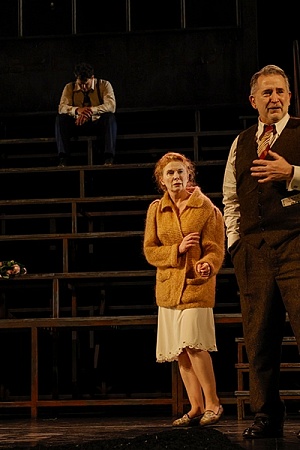Happy Days

Towards the end of the first act of Happy Days, Samuel Beckett spells out clearly the question that is at the heart of his work and that of the playwrights loosely grouped under the title ‘absurdist’. His protagonist, Winnie, buried up to her waist in earth, is describing the conversation of a couple who, wandering by, have caught sight of her. The man turns to his female companion. ‘What’s she doing? he says – What’s the idea? he says – stuck up to her diddies in the bleeding ground – coarse fellow – What does it mean? he says – What’s it meant to mean? … Do you hear me? he says – I do, she says, God help me … And you, she says, what’s the idea of you, what are you meant to mean?’
For Winnie, immured in her mound of dirt, it is only by projecting a relentless façade of happiness that she can keep despair at bay. She clings to her routines, brushing her teeth, taking her medicine, rummaging in her bag, and ending the day with a song in an attempt to create some structure in the void. In his monograph on Marcel Proust (1931), Beckett writes ‘habit is a compromise effected between the individual and his environment’, and for Winnie it is what stops her from using the pistol that keeps rising to the surface of her bag.
At one level, Happy Days, first performed in 1961, can be viewed as a portrait of a marriage. Marriage was much on Beckett’s mind since, while writing it, he had finally married his long-term partner Suzanne Dechevaux-Dumesnil. For various reasons, the wedding needed to take place in England, and Beckett had to maintain residence there for two weeks. It was during this time, in a hotel in Folkestone, that much of Happy Days was written.
It is this sense of a long-term relationship, one that Winnie both depends on and resents, that comes across strongly in Craig Baldwin’s production at the Old Fitz. Belinda Giblin’s Winnie is every inch, both the visible ones and the invisible ones, a Sydney eastern-suburbs matron. One can imagine that at one stage her garden parties were exemplary and her dinners flawless, with perfectly judged seating arrangements. She treats her husband, Willie – played by Lex Marinos as a series of grunts, groans and the occasional word uttered to the surprise and delight of Winnie – with brisk efficiency, directing him in and out of his hole. But she also depends on him to alleviate her loneliness, and Giblin’s eyes fill with panic when he doesn’t respond.
 Lex Marinos as Willie in Happy Days (photograph by Robert Catto)
Lex Marinos as Willie in Happy Days (photograph by Robert Catto)
At the play’s opening, as the piercing bell summons her to ‘another heavenly day’, Giblin is all chirpy ebullience, deciphering the script on her toothbrush, taking her medicine, and attempting to remember favourite quotations, the fragments shored against her ruins. With her clipped delivery she avoids the temptation that Beckett’s rhythms offer to chant the play. (Peggy Ashcroft, for one, practically sang the whole piece.) The fear of abandonment, of physical and mental decay seep through the exuberance. At a deeper level there is the acknowledgment of the pointlessness of existence: the question of what to do ‘between the bell for waking and the bell for sleep’. Giblin always keeps us aware of the effort it takes for Winnie to convince herself that things are for the best, which makes the occasions when she can no longer do so more powerful. There are moments, such as when Winnie almost breaks down remembering a compliment Willie made her after a party, that verge on the misty-eyed, but Giblin treats them with a truthful straightforwardness that robs them of any sentimentality.
By the second act, with Winnie now buried up to her neck, both the mood and the lighting have darkened, Baldwin having ignored Beckett’s instructions that the play should be performed in glaring brightness. Giblin makes Winnie’s little sayings and homilies more frantic, less convincing. There is now a touch of bitterness. When Willie at last comes around to the front of the mound and into her vision, she greets him with an irony verging on contempt. In some productions, as Willie vainly attempts to climb the heap, it is not certain whether he is attempting to reach Winnie or the gun. But here the lighting is so dark that the weapon is invisible and Baldwin makes it clear that Willie is attempting a last rapprochement. Although Winnie has just sung the sugary Merry Widow waltz, the icy look Giblin bestows on him as the play ends is not promising.
Just in case the message hasn’t got across, Baldwin and his set designer, Charles Davis have backed the mound with a faded poster of an idyllic beach and a slogan ‘resort there’s nothing like it’, the word ‘nothing’ prominent in bright yellow.
Red Line productions and The Old Fitz are doing well by Samuel Beckett. Krapp’s Last Tape, seen in 2019, was anchored by a magnificent performance from Jonathan Biggins. Belinda Giblin’s Winnie is also one for the ages.
Happy Days is being performed at the Old Fitz Theatre until 3 July 2021. Performance attended: June 12.
This article is supported by the Copyright Agency’s Cultural Fund.















Leave a comment
If you are an ABR subscriber, you will need to sign in to post a comment.
If you have forgotten your sign in details, or if you receive an error message when trying to submit your comment, please email your comment (and the name of the article to which it relates) to ABR Comments. We will review your comment and, subject to approval, we will post it under your name.
Please note that all comments must be approved by ABR and comply with our Terms & Conditions.